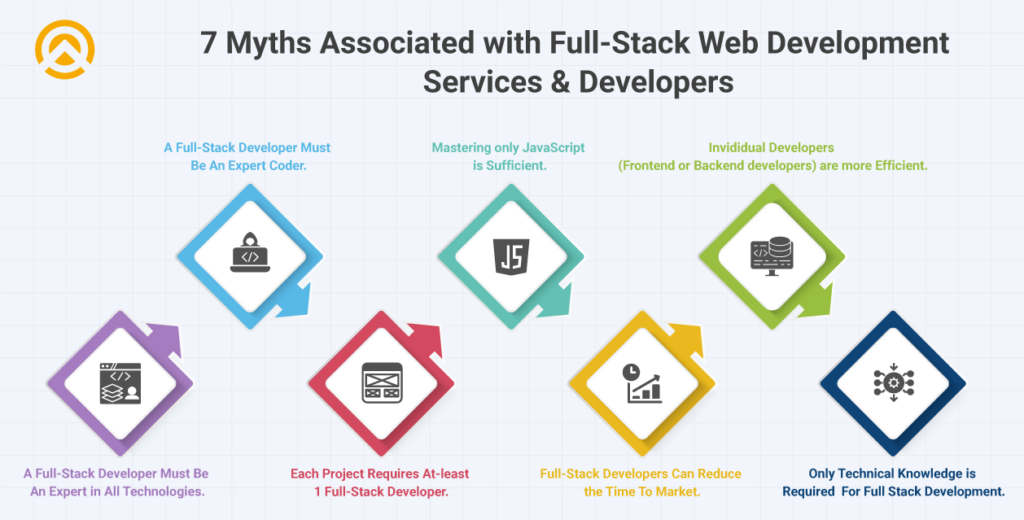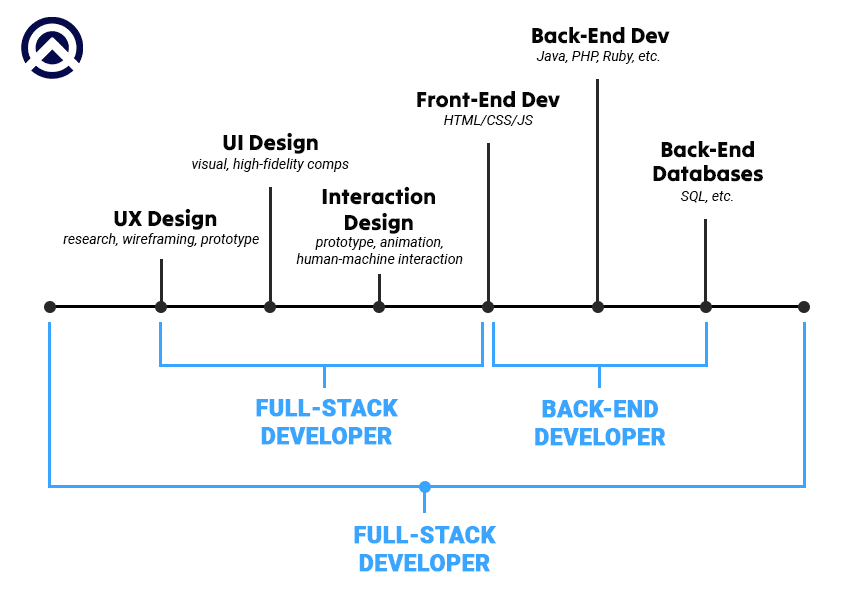Top 7 Myths Associated With Full-Stack Developers
The world is experiencing new innovations in cutting-edge technologies each year. However, to handle all the operations of full stack web development services there aren’t enough expert full-stack developers available. One of the major reasons behind myths on full-stack developer than required is that it is an extremely challenging role. In this job role, candidates are required to be highly versatile and they should process great IT skills. Full Stack professionals are considered the master in their fields.
Although, in this blog, we’ll cover a brief discussion about the associated myths on full-stack developer. Many professionals who want to jumpstart their career in this field or even professionals who are still in this field often struggle due to these myths. Thus, we decided that it is our duty to burst these myths because we are known in the industry as the best full stack development company.
7 Myths Associated with Full-Stack Web Development Services & Developers

Myths on full-stack developer invest their time & resources into getting insights about diverse technology frameworks, languages, etc. Full stack developers work in the front end and the back end of web development. They also handle the whole complexity of a computer network program.
Whenever a client, or site visitor, may see and interact with it is contained in the front end. The work of the backend process incorporates the servers, databases and other internal architecture that run the software.
The end-user does not engage with the back end and developers need to create fascinating front-end designs. To understand this role – let’s take an example of a restaurant. The “front portion” includes well-furnished, inviting dining spaces where customers enjoy their meals.
The “back end” is made up of the kitchen and pantry, which are normally out of sight from the consumer. Chefs (developers) make meals (information) for users by gathering ingredients that have been permanently saved in the pantry (the database) and performing operations on them in the kitchen (the server).
Today’s enterprises often depend on engineers to manage huge databases, connect to virtual machines and run net hardware. Getting a comprehensive, hands-on understanding of all these novel innovations takes time.
In the year 2020, Stack Overflow conducted an official survey. The main purpose of this survey is to identify different job roles and their link with IT professionals. As a result, it is observed that 54.9% of respondents identified their roles as full-stack developers, 23.9% as enterprise application developers, 12.1% as DevOps specialists and many more.
Although, in the IT industry, there are major prevailing myths related to full-stack development. It’s time to identify and present real facts in front of all people.
1. Myth: A Full-Stack Developer Must Be An Expert in All Frameworks, Programming Languages & Technologies
Whenever any on-shore client desires to take full stack development company services then he/she often thinks that if they are hiring full stack developers then he/she must be an expert in all the technologies domains. However, in reality, it is not true that any full-stack developer must be an expert in all technological domains. myths on full-stack developer must have insights about technologies but it is wrong to consider them experts in all tech stacks.
2. Myth: A Full-Stack Developer Must Be An Expert Coder
Whenever we see any movies related to cyber roles then we mostly see a common role in which a person is coding like a “pro-level coder”. By seeing such role people who are not familiar with IT roles often thinks that software development is only about coding.
The role of a full-stack developer is far more than only coding. When you hire full-stack developer then he/she is responsible for the coding part, development roadmap part, testing and all. So, it is clear that this job role is not limited to the coding part and there are many responsibilities also which are covered in this role.
3. Myth: Every Project Must Require At-least 1 Full-Stack Developer
Whether a project should have a full-stack developer or not – it is entirely dependent upon the project requirements. It is not necessary that every project must have a full-stack developer. If you can employ enough front-end developers, back-end developers & software testers in a small-size project then there is no need for any full-stack developer in a particular project.
However, if your project requirement indicates the necessity to hire a full-stack developer then you must add them. So, if your project is entirely dependent on the front end or if your project is entirely focused on the back end then you can hire them individually.
After reading till this point, a question can arise in your mind – do projects can be completed with individual developers rather than hiring full-stack developers? The answer is “no”, you cannot run all the projects without full-stack developers because they keep an entire coordination of work across all stages. You can only run a project without hire full-stack developers if your projects are either front-end focused or back-end focused.
4. Myth: Mastering only JavaScript can Transform Anyone into Full-Stack Developer
JavaScript is a versatile programming language that can be used for both front-end and back-end development. On the front end, JavaScript is commonly used to create interactive elements and handle user interactions in web browsers. On the back end, JavaScript can be employed with frameworks like Node.js to build server-side applications.
While having expertise in JavaScript is undoubtedly valuable for full-stack app development, becoming a proficient full-stack developer typically involves more than just mastering one programming language. It often requires familiarity with other programming languages, frameworks, and technologies used in front-end and back-end development.
However, it is not appropriate to think that mastering only JavaScript will make you an excellent full-stack developer. You need to gain insights into all the useful frameworks, technologies and programming languages. If you are new to this journey then it may require you to invest your time in the development process.
Although, if your project is at the initial stage then you can incorporate MVP Development Services. These services will help you to generate early-stage feedback on your product or services. Later on, you can rectify or modify them with the help of your team engineering consisting of full-stack developers and other experts.
5. Myth: Compare To Individual Developers, Full-Stacks Developers are Less Efficient

Many IT professionals believe that full-stack development solutions have insights about all technologies but they did not have mastery over a specific domain. So, instead of hire dedicated full stack developer sometimes companies prefer to hire individual frontend developers or backend developers or they hire react native developers. Although, this approach is not wrong and it is entirely the choice of an organization to design their own strategy. However, it is not appropriate to think that full-stack developers are less efficient than any specific group of developers.
6. Myth: Full-Stack Developers Can Reduce the Time To Market
Almost every full-stack developer showcases their optimum efforts in completing the project. However, it is not guaranteed that if any project has full-stack developers then they will surely reduce the time to market.
Reducing the time to market is entirely dependent upon various key factors – such as: efficient project management, robust planning & strategy, rapid prototyping, market research, customer validation and many more. In this scenario, mobile application development services can also help in reducing the time to market.
7. Myth: Only Technical Knowledge is Required For Full Stack Development Services
It is a myth that only technical knowledge is required for full-stack development services. While technical expertise is undoubtedly crucial, full-stack development encompasses more than just technical skills. It involves a combination of technical proficiency, problem-solving abilities, and a broader understanding of various aspects of software development.
To be an effective full-stack developer, one needs to possess not only programming languages, frameworks, and tools but also a comprehensive understanding of front-end development, back-end development, databases, user experience, and system architecture. Furthermore, communication skills, collaboration, project management, and the ability to adapt to new technologies are equally important.
Therefore, while technical knowledge forms the foundation, being a proficient full-stack developer necessitates a holistic skill set that encompasses technical expertise, problem-solving capabilities, and a comprehensive understanding of the complete development process from end to end.
Although, they should keep their knowledge updated to develop innovative products. As latest technology stacks will help them to create an effective product with higher functionalities.
Conclusion
Till now, we have busted almost 7 myths on full-stack developer. Although, the job role of the full-stack developer is highly precious and it is necessary that people should be empowered with real information about this role.
At Amplework, we have a team of prowess full stack developers who handle different job roles. Our developers are known for providing cutting-edge business solutions to elevate businesses. Your search for an affordable full stack development service ends at Amplework Software. So, connect with us and experience the difference.



 sales@amplework.com
sales@amplework.com
 (+91) 9636-962-228
(+91) 9636-962-228





